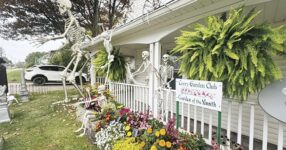The Corry Garden Club has chosen Helen Wawrejko of West Smith Street with her festive garden, adorned with Halloween-themed skeletons.
Corry Garden Club’s Melissa Martin stopped by her house while walking recently and spoke with her about her garden. At the time, Wawrejko was in the process of setting up her fall holiday decorations.
“I have noticed her garden all summer, though, because her ferns are huge, and her flowers look so healthy,” Martin noted. “Helen told me she wasn’t sure what she was going to do with her ferns this winter, because she didn’t want them to die. She found out she can keep them in her basement, and they will come back next year.”

Wawrejko’s garden features Black-eyed Susans like these, among other perennials.
In her front garden bed, Wawrejko has black-eyed Susans, marigolds, creeping Jenny, alyssum, Hypoestes pink, coreopsis and a few other perennial flowers.
What’s more, her front yard and house has been taken over by skeletons of all sizes and shapes. Martin said her favorite was the skeleton riding the flamingo (pictured above).

At right, skeletons are shown hitching a ride atop a black flamingo.
“September is the last month we have a garden of the month,” Martin said. “We will start back up in May 2025. We hope everyone has a safe fall and winter season.”
When putting one’s garden to bed for the winter, Martin suggests saving seed heads from sunflowers, daisies and other flowers and tying them to posts or tress for the birds to eat during the cold winter months.
When choosing trees and bushes to plant in the yard, it’s often a good idea to choose native species, because they are often less expensive and can tolerate northwest Pennsylvania winters better.
Old newspapers are best to be used as mulch and weed barriers, because colored or glossy sheets have undesired chemicals. A coffee filter in the bottom of houseplants or outdoor potted plants can keep soil from escaping while still allowing water to drain.
It’s best to rotate where vegetables are planted each year, as this can cut down on diseases. Keeping a compost pile is a great way to save money on peat moss, but it’s not recommended to add mildewed or diseased leaves, because those spores can spread to new plants when the compost is added to the garden the next year. Also noteworthy is that Rose and raspberry thorns will not rot over the winter.




